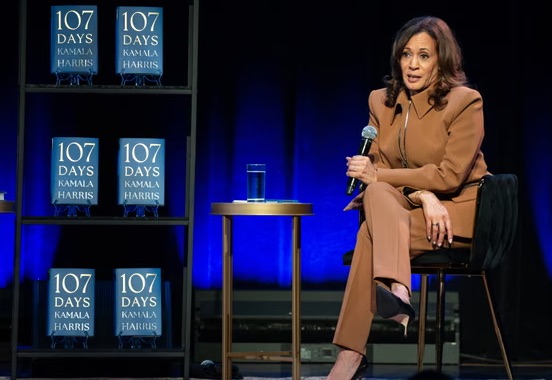Five minutes is all it takes to make a simple peanut-butter-and-jelly sandwich. You can watch an episode of your favorite crime drama in an hour. In 24 hours’ time, your heart will beat 100,000 times to pump roughly 2,000 gallons of blood through your body. You can take a vacation in a week, set or release a new habit in three, learn a new task in a month.
In “107 Days” (Simon & Schuster, September 2025) by Kamala Harris, 49th vice president of the United States, it takes real time to make history. When she learned that she would ultimately be the Democratic Party’s nominee for the 2024 presidential election, the then-vice president was relaxing at home with her great-nieces and a jigsaw puzzle. The phone rang; it was her “boss,” President Joe Biden, calling to tell her that he was halting the re-election race he’d been running for months, and was throwing his support to her.
Thus begins this open, sometimes controversial, straightforward political memoir, with the title referencing the length of her campaign.
With that pragmatism many have come to expect of her, Harris writes that she immediately made a few demands. She believed that timing and verbiage were key on any announcement that the Biden camp made, and she says she absolutely insisted that it be done right. What she was about to embark on wouldn’t be easy. She understood that it would be “the shortest campaign in modern presidential history” in a country torn by political division almost immediately after the election that made her vice president.
Oh-so-carefully but adamantly, she insists that she was loyal to Biden throughout, but acknowledges trouble spots when he was tired or overstressed. She and her staff instantly began planning. The choosing of her VP offers a fascinating look inside the journey to today’s White House (or, at least part of it)—and in this, Harris explains why she didn’t make certain choices.
A lot of Harris’s frustration comes through in this book—at Biden and his staff for occasional lack of support and recognition, at oppositional politics, at foreign governments, media, and at herself. The grievances are sometimes seething, allowing readers to conclude that the stress of campaigning, non-stop travel, and sleepless nights while continuing to perform vice presidential duties impacted Harris. Her campaign, she writes, “was fresh, alive, vibrating with energy…seemed like anything was possible,” but her descriptions of the rigor of campaigning can suggest otherwise.
“This is not a genteel profession,” she says. “You must be ready to brawl.”
In light of that avowal, you may be surprised to know that there isn’t an overly excessive amount of opposition-bashing here. Yes, there’s some—but Harris mostly takes Michelle Obama’s “go high” stance.
“I do know that I tried,” she says.
Throughout “107 Days,” Harris shows little reticence. She is blunt, pulls no punches, and is sure to leave a lot of peeved people in the wake of her narrative. Still, if you voted Blue nearly a year ago, or if you’re concerned about politics today, it’s time for this book.








